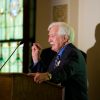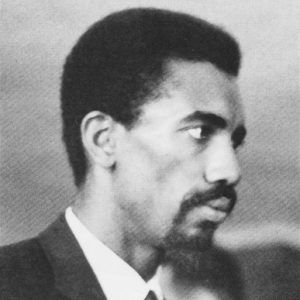calsfoundation@cals.org
Henry Dumas (1934–1968)
Henry Dumas was a critically acclaimed author of poetry and fiction who captured, in some of his finest work, many of his childhood experiences as an African American living in southern Arkansas.
Henry Dumas was born on July 20, 1934, in Sweet Home (Pulaski County), sometimes called Sweetwater, and he continued to live there until he moved with his family to Harlem when he was ten years old. Almost no information about Dumas’s childhood is available, yet his life in the deep South and the desolate conditions confronting black Southerners in that era are insightfully depicted in several of his writings, including his widely admired short story, “Goodbye, Sweetwater.”
Dumas graduated from Harlem’s Commerce High School in 1953 and then attended City College in New York but quit after one year. He then entered the U.S. Air Force and was stationed primarily at Lackland Air Base in San Antonio, Texas, and on the Arabian Peninsula. While in the air force, he married Loretta Ponton on September 24, 1955. They had two sons.
After his discharge in 1957, Dumas enrolled at Rutgers University as a part-time student, but he left in 1965 without completing his degree. During this period, he also worked as a printer operator at IBM (1963–1964) and as a social worker for the state of New York (1965–1966). He was active in the civil rights movement, transporting food and clothing to civil rights workers in Mississippi and Tennessee.
In 1967, Dumas began a position as assistant director of Upward Bound at Ohio’s Hiram College. He then became a teacher and counselor in the Experiment in Higher Education program at the University of Southern Illinois. It was there that Dumas met Eugene B. Redmond, a teacher, critic, and author who would later champion Dumas’s work and become his literary executor.
On the evening of May 23, 1968, Dumas was shot and killed by a New York Transit policeman. Details surrounding his death remain sketchy and controversial; some evidence suggests that this shooting was a case of mistaken identity, while other evidence suggests that Dumas’s behavior led the officer to believe that Dumas was reaching for a weapon. Regardless of the exact circumstances, Dumas’s tragic, early death serves as a reminder of the capricious state of black men in American society during the 1960s and beyond.
Although Dumas’s work was published in several small magazines and journals in the 1960s, such as Hiram’s Poetry Review, Negro Digest, Trace, and Umbra, and in the anthology Black Fire, he did not publish a book-length collection during his lifetime. A vast majority of his work remained unpublished upon his death. It is primarily through the efforts of Redmond that Dumas’s work has been placed before the public. Some of the collections that Redmond helped guide to publication are “Ark of Bones” and Other Stories (1974), Play Ebony: Play Ivory (1974), Goodbye, Sweetwater (1988), Knees of a Natural Man: The Selected Poetry of Henry Dumas (1989), and Echo Tree: The Collected Short Fiction of Henry Dumas (2003). These works demonstrate that Dumas was a prolific, innovative, and eclectic creator who delved into numerous social and political issues through a variety of modes of expression, such as gospel, jazz, blues, parable, nature imagery, folklore, religion, and superstition.
The Henry L. Dumas Foundation, a non-profit organization based in Sweet Home, established a garden in the community and announced plans to create a cultural center, complete with a library and an archive of Dumas’s works, in the old Jesse Thomas Grocery Store building.
For additional information:
Carter, Mathes. “The Second Sight of Henry Dumas: Envisioning Black (Im)possibility in the U.S. South.” Oxford American, Fall 2021, pp. 112–118.
Dumas, Henry. Echo Tree: The Collected Short Fiction of Henry Dumas. Edited by Eugene B. Redmond. Minneapolis: Coffee House Press, 2003.
———. Goodbye, Sweetwater: New and Selected Stories. Edited by Eugene B. Redmond. New York: Thunder’s Mouth Press, 1988.
Henry L. Dumas Foundation, Inc. https://henryldumasfoundation.org/ (accessed January 24, 2023).
Harris, Trudier. “Henry Dumas’ Life and Career.” In The Oxford Companion to African American Literature, edited William L. Andrews, Frances Smith Foster, and Trudier Harris. New York: Oxford University Press, 1997.
Mitchell, Carolyn A. “Henry Dumas.” In Digest of Literary Biographies: Afro-American Poets since 1955. Vol. 41, edited by Trudier Harris and Thadious M. Davis. Detroit: Gale Research Company, 1985.
Taylor, Clyde. “Henry Dumas: Legacy of a Long-Breath Singer.” Black World (September 1975): 4–16.
Williams, Helaine. “Professor, Friend Keeps Alive Memory of Henry L. Dumas.” Arkansas Democrat-Gazette, September 16, 2018, p. 6E.
———. “Sweet Home Hero.” Arkansas Democrat-Gazette, September 16, 2018, pp. 1E, 6E.
Wright, C. D. “Return to Sweetwater.” Arkansas Times, April 1991, pp. 48–51.
Phillip Howerton
North Arkansas College
 Westbrook, Parker
Westbrook, Parker Henry Dumas
Henry Dumas 



Comments
No comments on this entry yet.